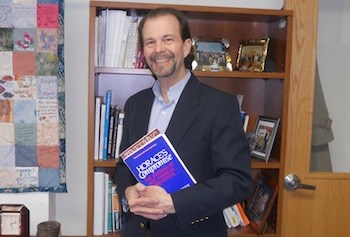GSE Prof Researches Teaching Beyond Standardized Testing

03/01/2013
By Karen Angelo
James H. Nehring, associate professor in the Graduate School of Education, has been selected as the 2013-2014 Fulbright Scholar for Northern Ireland Governance and Public Policy.
Nehring will be in residence at Queens University Belfast for the upcoming fall semester. He will conduct research on schools serving lower-income communities that teach skills above and beyond those measured by standardized, government tests.
“I am honored to be selected for a Fulbright, and I am excited that this important research will be able to move forward as a result,” says Nehring.
A wealth of research demonstrates that the pressure of high stakes tests narrows the curriculum. Schools serving low-income families are under the greatest pressure to improve test scores.
“Teaching and learning suffer the most in these schools, however, there are some outlier schools successfully serving lower income communities,” says Nehring. “Despite test pressure, these schools teach students a wide range of skills such as creative problem solving, collaboration, leadership, intellectual openness and reflection. How do they do it? How can other schools do likewise? How can we alter policy to promote what they are doing?”
Nehring hopes that his research results will provide practical guidance for school leaders and suggestions for policy makers who want schools to teach beyond the test.
“We chose schools in Northern Ireland, Israel and the United States for our study, in part because all three jurisdictions have high stakes tests and a history of education inequality,” he says. “We are concerned that inequality is widening as test pressure rises.”
Before coming to UMass Lowell in 2006, Nehring taught in public schools for 25 years. He led the startup of three public high schools designed to foster intellectual, social and emotional growth. He is the author of five books and numerous articles on education.
The Fulbright Program, sponsored by the U.S. Department of State, is the United States’ flagship program for international exchange of scholars. Fulbright Awards are highly competitive and among the most prestigious scholarship programs worldwide.
The Fulbright Commission selects scholars through a rigorous application and interview process. In making these awards, the commission looks not only for academic excellence but a focused application, a range of extracurricular and community activities, demonstrated ambassadorial skills, a desire to further the Fulbright Program and a plan to give back to the recipient’s home country upon returning. Since 1948, 43 Fulbright alumni have won Nobel Prizes and seventy-eight have won Pulitzer prizes.
Says Nehring: “It is truly an honor to be selected as Fulbright Scholar and I am thrilled that I will have the opportunity to continue learning how certain schools serving lower income communities are successful despite test pressures. We have a lot to learn and gain from the results.”
